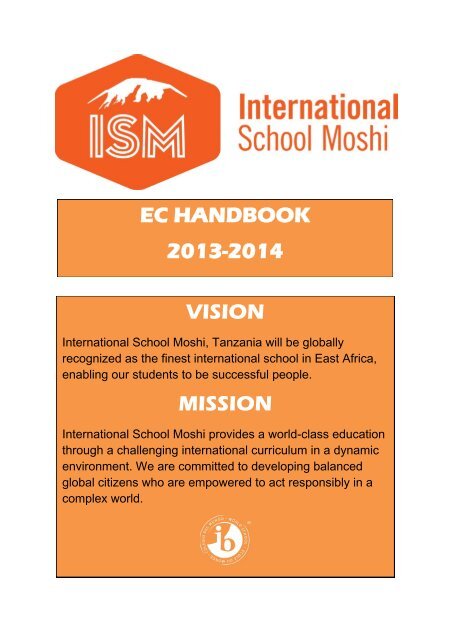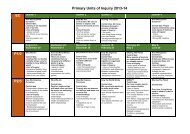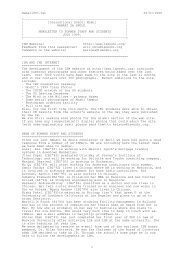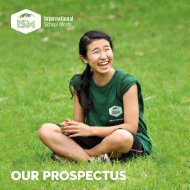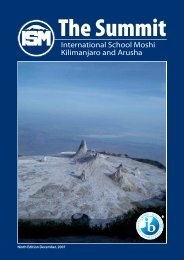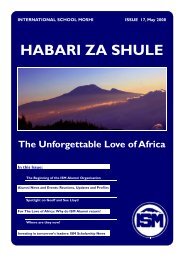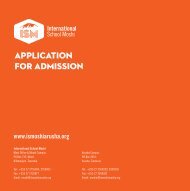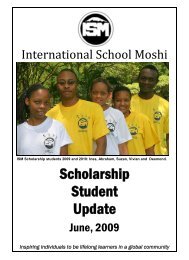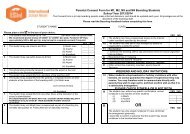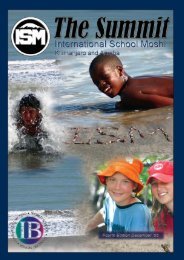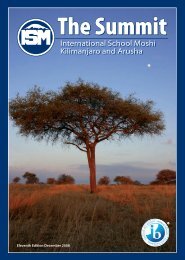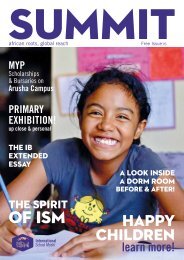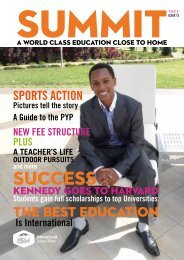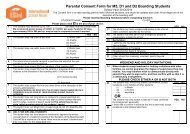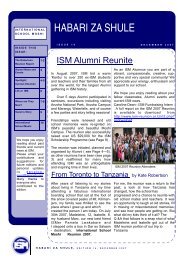Primary Handbook - International School Moshi
Primary Handbook - International School Moshi
Primary Handbook - International School Moshi
You also want an ePaper? Increase the reach of your titles
YUMPU automatically turns print PDFs into web optimized ePapers that Google loves.
EC HANDBOOK2013-2014VISION<strong>International</strong> <strong>School</strong> <strong>Moshi</strong>, Tanzania will be globallyrecognized as the finest international school in East Africa,enabling our students to be successful people.MISSION<strong>International</strong> <strong>School</strong> <strong>Moshi</strong> provides a world-class educationthrough a challenging international curriculum in a dynamicenvironment. We are committed to developing balancedglobal citizens who are empowered to act responsibly in acomplex world.
Education at ISM<strong>International</strong> <strong>School</strong> <strong>Moshi</strong> is accredited to offer all three <strong>International</strong> Baccalaureateprogrammes. The I.B. Programmes grew out of the necessity to provide a rigorous,quality-assured education programme for highly mobile families subject to regularrelocations. All students are taught through traditional subjects that includeLanguages, Sciences, Mathematics, Humanities, Health and Physical Education andTechnology, through inquiry based methods. As students progress through the threeprogrammes, there is an increasing emphasis on subject content.CurriculumThe curricula at ISM are benchmarked, bysubject areas from Pre K to Grade 12 againsta minimum of three curricula from Australia,USA and the United Kingdom and arebalanced by a broad range of co-curricularactivities, including sport.In line with the most modern teaching theory,students learn best when they integratelearning with their world experience, and thisis supported at ISM by inter-disciplinary units.Programmes of study are supervised byProgramme Coordinators, who ensure that ineach grade level students will achieve theexpected standards set by the IB.AssessmentAll major assessments andreports are complemented bystudent responses on notonly what, but how, theyhave learnt. In addition, theexternally moderated I.B.programmes and annualstandardised tests(<strong>International</strong> <strong>School</strong>sAssessment, the PSAT andSAT) assure parents of ourcommitment to the highestacademic standards.LanguageReflecting our international perspective, ISMpolicy is to keep consistency for every studentin using the English they have already beentaught. ESL support is provided for studentswhose home language is not English shouldthey require so.The language of instruction is English, withLanguages A generally considered tobe the home language. In support of the I.B.requirement that students be multi-lingual, andtaking into account our East African context, alarge majority of students study Swahili andFrench as second languages.AssemblyAssemblies are opportunitiesfor the school to meet as awhole, or within PYP, MYP/DP groups. Assembliesreinforce learning in classes,allow students to perform bycelebrating special events,Units of Inquiry and other ,encourage a sense ofcommunity, offer a practicalopportunity forannouncements and allowfor recognition of studentachievements.ISM education fosters critical learning through the three I.B. Programmes designedto meet the needs of <strong>Primary</strong> (age 3 to 11 years), Middle Years (age 11 to 16) andDiploma (age 16 and older).
PYP style: Units of InquiryIn the primary years of education it is important to provide opportunities for studentsto build meaning and refine understanding, principally through structured inquiry.Children, from birth, are full of curiosity. The PYP provides a framework that buildson this to give crucial support for them to be active inquirers and lifelong learners.CurriculumThe PYP curriculum is broad,balanced and inclusive. A balance issought between acquisition ofessential knowledge and skills, thedevelopment of conceptualunderstanding and the demonstrationof positive attitudes. The importanceof traditional subject areas isacknowledged: language (English andKiswahili), mathematics, socialstudies/humanities, science, thearts and personal social and physicaleducation. These subject areas aretaught through Units of Inquiry, atransdisciplinary approach, the PYPteaching team ensures that studentwill achieve high expectations in termsof learning outcomes.AssessmentIn the PYP, assessment shouldeffectively map students’ developmentin the understanding of concepts, theacquisition of knowledge, the mastery ofskills, the development of attitudes, andthe ability to make decisions to takeresponsible action. On-goingAssessment in the PYP classroom willinclude analysis of students’ work orperformances using rubrics, checklists,pencil/paper tests, daily observationsand portfolios, summarized on reportsand shared with parents during ThreeWay Conferences. Students are activelyinvolved in assessing their ownlearning. They create their own StudentPortfolios; they show their learningin Student Led Two Way Conferences .LanguageIn the PYP, ESL students from P1/2 toP5/6 receive support from ourspecialist ESL teacher who worksclosely with the class teachers andLearning Support teacher.All students study Kiswahili for two 40minute periods a week. In addition,P3/4 and P5/6 students study Frenchfor two 40 minute periods a week.ESL students are withdrawn for extrasupport during French time.AssemblyThe purpose of our Assemblies isfor the students to share some of theirlearning to build a sense of communitywithin the school and to publiclyacknowledge students who show theLearner Profile through their behaviourin our school. Each class has a turn toshowcase what they have learnt.Parents are welcome to attend theseassemblies.PYPPYP students are accompanied by a whole teaching team, led by the class teacher.The class teacher is helped by a Teaching Assistant and also works in a team withspecialist teachers. In the PYP, regular communication between the teachers andparents takes place through the Homework and Communication book. The following<strong>Handbook</strong> is intended to convey to parents and students a broad understanding ofthe content and sequence of the material covered at each grade level. Additionaldetail on each of these programmes can be found on the ISM website, curriculumdocumentation, and IB website.
Welcome to ECYour Class Teacher:Mrs Annalee HortonMrs Annalee HortonMiss GraceYour Teacher Assistant:Miss GraceAs a Classroom Teacher I have responsibilityfor your child. I am the first point of contactregarding social and academic concerns,and I would welcome your continuedparticipation in ensuring your child’s success.The <strong>School</strong> Day:Each day begins with a short registration period in which the register is taken. TheHome Classroom is the basis of our *Pastoral Programme, and the Class Teacher ismost likely the first person parents will contact.Daily Routine: <strong>School</strong> begins at 7:30am and you are encouraged to arrive at schoolon time so that your child can settle to their activities with their peers. Your child willbe supplied with a communication folder which contains any notes and requests forappointments. Absence notifications can be communicated through thecommunication folder. Parents are urged to read the weekly newsletter sent out byemail every weekend. It contains important information about what the children willlearn the following week and how you can be involved as parents. Children willparticipate in daily tasks aimed at extending and developing their confidence, selfesteemand awareness, literacy, numeracy, social and thinking skills.Dress Code: Students are required to wear either a school polo shirt or school T-shirt available from reception. No flip flops are allowed.Each child has a personal peg outside each room where they can hang their bagsand jackets. We ask that each child has a spare set of clothes that can be kept atschool in case of any accidents.Snacks and Lunch: There is a break between 10:00-10:35am and students areasked to bring a healthy snack every day. For lunch children can either purchaselunch from the school dining hall or bring their own lunch. On days that we have PE,children are asked to wear the school house shirt and appropriate shoes for physicalactivity (these shoes may be kept at school). At the end of the day, children are to bepicked up from the classroom by their caregiver (an adult or older sibling), unlessthey are staying for afternoon clubs.Valuables: Please do not let your child bring valuables to school. The school takesno responsibility for valuables that are lost or damaged. Mobile phones are notallowed in the classroom.
Scheduling: Daily TimetableMon - ThursPeriod Start EndRegistration 7.30 7.45Session One 7.45 10.00BREAK 10.00 10.35Session Two 10.35 11.15There is a whole school assembly on alternate Mondays which starts at 7.35 andends at 8.00.Clubs are on Monday to Thursday and EC children can take two clubs only. Thereare no afternoon clubs on Friday.HomeworkParents are encouraged to support their child's learning by talking about the mainconcepts of an Inquiry and to ask questions. This can be done in their homelanguage. Each night children are encouraged to listen to stories being read byadults. This may be a library book or another book from home. As children are ready,they will begin to bring home appropriate small books to read with an adult twicea week. When these come home parents will be provided with guidelines on how tohelp their children. Children may be asked to do special home activities with theirparents throughout the year. Extra appropriate activities may be given to childrenthroughout the year.Parent participation:Throughout the year parents are encouraged to help out in various ways both in andout of the classroom. When class field trips are organised a letter home will ask forhelpers and for any parents who wish to attend. Parents may be asked to help out inthe classroom with specific activities. We also welcome any parents who would liketo cook, read or share a craft with the class.Special Events: EC children participate in the annual PYP drama production. Theyalso prepare several assemblies. There are also Spirit Days, UN Day, Halloweenand Book Week where children will have an opportunity to dress up.EC children are actively involved in hands on experiences which help them developtheir knowledge and skills. Parent support, both in and out of the classroom, is anasset to every child's development.Birthdays: Parents need to contact the class teacher in person a week in advance ifthey wish to bring a special treat to be shared with the class on their child's birthday.While we welcome cakes, we discourage candy and soda.
PYP Programme of Inquiry - POIStudents inquire into 6 (4 for EC) globally significant issues in the context of UNITSOF INQUIRY, each of these addresses a central idea which has to be engaging,relevant, challenging and significant. The programme of inquiry includes as much aspossible from our host country. Each unit lasts approximately 6 weeks (9 weeks forEC). Inquiry is the process initiated by the students and guided by the teacher thatmoves the students from their current level of understanding (tuning in period,guided questions by teachers) to a new and deeper level of understanding.The ISM PYP Coordinator oversees the programme to ensure that the units taught ateach level provide a balanced range of experiences and outcomes and that there isprogression through the grade levels.At ISM because we have combined classes, we operate a two year cycle for ourPOI. 2013/14 will be Cycle One.Who we are28/10/13 – 20/12/13Central Idea: We useour senses to exploreand discover the worldaround us.Lines of Inquiry: - The five senses How we use oursenses How our senseswork together How our senseskeep us safeConcepts: form, functionTransdisciplinary Skills:Thinking; selfmanagementLearner Profile:knowledgeable; inquirer;balancedHow we expressourselves22/4/14 – 20/6/14Central Idea: Peopleexpress themselvesusing many types ofmediums.Lines of Inquiry: - Colour art mediums 2D and 3DcreationsConcepts: causation,form, perspective,reflectionTransdisciplinary Skills:communication, socialLearner Profile:Communicator, inquirer,open-minded
The CurriculumStudents in the PYP study a range of subjects that are separate and integrated withother subjects, in accordance with educational studies showing that learning besttakesplace when it is related to the real world, common experience and integrated acrossthe curriculum.Traditional subjects and their associated skills remain important,and are weighted across the school day.How the world works How we organiseourselves15/1/14 – 28/3/1412/08/13 – 11/10/13Central Idea: All living Central Idea: Learning isthings go through a an important part of ourprocess of change. life.Lines of Inquiry:Lines of Inquiry: -Life cyclesHow living thingschange over theirlifetimeConcepts: change,reflection, causationTransdisciplinary Skills:thinking, researchLearner Profile: risktaker, reflective, caringPlaces we learnOur school as ourlearning placeLearning areas inour schoolConcepts:function, responsibility,connectionTransdisciplinary Skills:social; self-managementLearner Profile:principled; thinker;knowledgeable
Language ArtsLanguage Arts consists of oral language (listening andspeaking skills), and visual language (viewing & presenting),as well as the more well-known elements of reading andwriting. In EC, these areas of language are taught bothexplicitly and in an integrated manner to provide context andreal life experience. Children are introduced and taughtphonemic awareness skills through reading and writingactivities. Oral language skills have a particular daily focus inEC as the children develop independent skills for success inall subject areas. Reading includes book awareness, introduction to letter soundsthrough the ‘Letterland’ scheme and sharing books together. Writing involves thedevelopment of fine motor skills through a variety of activities. Students areencouraged to answer questions, express their needs or feelings, listen toinstructions, stories, tapes, rhymes and poems.Date Unit Content Assessment12/8/13-11/10/13 How we organiseourselves‘This is our school’28/10/13-20/12/13 Who we are‘Our five senses’15/1/14-28/3/14 How the world works‘Life cycles’22/4/14-20/6/14 How we expressourselves‘Art Attack’Stories about school.Making signs about thedifferent learning areasin the classroom.Talking about favouriteway to learn.Oral languagedeveloped throughexploring senses usingmaterials provided.Asking and answeringquestions. Readingnon-fiction books toinquire into senses.Understanding thedifference betweenfiction and non-fictionUsing writing anddrawing to explaindifferent life cycles e.g.butterflies, frogs,chickens. Correctsequencing and usingoral language toexplain life cyclesUsing language todescribe a variety of artmediums and feelingswhen looking atartwork. Usinglanguage to talk aboutown art creations andwhat their inspirationwas. Asking andanswering questionswith visiting artists.Draw/write about whyyou go to school.Explain what you learnin each area of theclassroom/schoolObservations,participation indiscussions in smalland large groups,asking and answeringquestions about thesenses. Explainingwhat you do with yoursenses throughindividual ‘sensesbooks.’ Acting out howsenses can keep ussafe.Ability to assign amessage to theirwriting and drawings.Observations ofchildren’s use oflanguage to explainwhat they have foundoutAnalyse students’ability to express anidea or a feelingthrough their art as wellas discuss the art offamous artists. Presentan art exhibition and beable to talk to smallgroups about theirpieces.
ReadingReading in EC involves daily story reading to develop a love of literature. A picturestory book or author is selected each week as the focus for related activities. ECchildren will be exposed to many reading situations such as books, stories, chartsand songs. Children will read and be read to daily with support and guidance throughindependent, small groups and whole class situations. Through these experienceschildren will gain an understanding of concepts about print.Students will be encouraged to join in discussions and answer questions related tothe stories.They will be introduced to letter sounds through songs in the Letterland Program.In reading some of the content covered will be: Through the use of big and small books reading-like behaviours are modeled. Develop word identification strategies. Comprehension of simple text. Retell text and make connections tothemselves. (E.g. “I have a dog too”). Develop a list of words they can read. Recognition of some letter names and sounds. Begin to form an awareness of letter and sound recognition. Develop an understanding that text carries a constant message. Join letters together to form simple spoken words.
MathematicsIn mathematics the focus will be building on theirknowledge. The students will work extensively withmanipulatives to show clear understanding ofconcepts. Skills will be developed in all mathematicalstrands. Students will work both in ability and mixedability groups that will change throughout the yearaccording to student needs. Extension work will beprovided beyond the concepts outlined below if and when students are ready. Thefull set of outcomes for Mathematics in the PYP can be obtained from theHead of <strong>Primary</strong> or class teacher.Unit Content AssessmentHow we organiseourselves‘This is our school’12/8/13-11/10/13Number at students own level; counting,reading, writing, estimating, ordering, one toone correspondence when counting. Usingmoney to shop. Selecting appropriatemethods to solve problems in groups andindividually.Measurement of time; daily routines.Awareness of weekly and daily routines atschool. Understanding of morning, afternoon,day and night, days of the weekMark down on individual continuumswhat the students can do in number.Students take part in shoppingactivities and show theirunderstanding that money can beexchanged for goods.During calendar time and discussionsabout school, make observationalnotes about students’ understandingof their routines and knowledge ofdays of the week.Who we are‘Our five senses’28/10/13-20/12/13How the world works‘Life cycles’15/1/14-28/3/14How we expressourselves‘Art Attack’22/4/14-20/6/14Sorting real-life objects into sets according towhat sense they are connected with.Collecting and recording data about senses.Weighing and measuring in cooking activities.Counting, reading, writing, ordering,conservation and estimation. Vocabulary ofmore and less, understanding of conservationof number through manipulative play.Discussion of what numbers are used for andidentifying numbers in the environment.Number stories. Use of manipulatives todevelop an understanding of ways torepresent addition and subtraction.Measurement of time; Vocabulary of ‘before’and ‘after’ when describing life cycles,Use of ordinal numbers to describe the stagesof life cycles, 1 st , 2 nd , 3 rd .Measurement; length and height. Usinglanguage such as big,long,tall, short andcomparing heights and lengths.2D and 3D shapes. Participate in shaperelated games and puzzles, sort and describeshapes using everyday language such assides, corners, straight and curved. Produce2D and 3D art pieces and understand thedifference between them. Use building blocksand other manipulatives to make models andthen draw what they have made. Usepositional language, such as in front of, nextto, above, below.Graphing of favourite coloursExploring patterns in artworkNumber at students own levelObserve children sorting a variety ofobjects either to a given criteria ortheir own. Take photos of studentsmaking graphs using real objects.Make observational notes on whetherstudents can compare quantitieswhen analysing graphs. Do studentshave an understanding of weighingwhen cooking? Use continuums tohighlight attainment in numberChildren show an understanding ofaddition and subtraction by making uptheir own number stories that involvethese operations and then usemanipulatives to solve them.Sequence stages in a life cycle usingthe correct ordinal numbers.Through play, show an understandingof measurement terms. Order objectsaccording to height and length.Make observational notes of studentsability to cooperate in shape gamesas well as be able to complete shapepuzzles. What is the differencebetween 2D and 3D shapes? Can thestudents transfer this understandingto art? Take photos of studentsbuilding models using 3D materials.Can they reproduce this in a drawing.Note down understanding ofpositional language as they draw.Can students identify, copy, continueand create patterns? Take photos
KiswahiliStudents are able to understand and respond to teachers’ instructions.Students can answer questions using basic vocabulary and sentence structures.Students can count numbers to 10 in Kiswahili.Introduce themselves by telling their name,Students show interest in learning simple Kiswahili stories, songs and games.Parents should understand this is a general frame for EC Kiswahili and we willmoderate teaching content and learning outcomes according to students’ needs.Kiswahili is taught by the teaching assistant.ScienceScience in EC is taught informally and within the units of ‘The fivesenses’ and ‘Life Cycles.’ Students develop observational skills, makesimple predictions and show care and respect for themselves and theenvironment. Students recognise some basic cause and effectrelationships. They will be encouraged to askquestions. Questioning is a key strategy applied in all areas.The science process encourages 'hands on' experiences and inquiry learning.HumanitiesIn EC Humanities has a focus in the ‘Our <strong>School</strong>’ unit. During the other unitsmany aspects of Humanities are taught through an interdisciplinary approach.Humanities in EC is also taught through social skills. Appropriate behaviourtowards others is talked about all year — a caring, sharing environment isfostered. Students learn about their immediate world — the class and school.The Arts: Visual ArtsDuring all our units students use the Visual Arts discipline tocommunicate and express themselves using a wide variety ofmedia, complete assessment tasks and share ideas. Art is usedas both a stand-alone subject and to enhance all the Units ofInquiry.Visual Arts in EC involves daily activities with differentmaterials and mediums. Each week students will draw, colourand paint to express themselves and to develop fine motorskills. Their art work will be in response to their personalexperiences, imagination and literature.
Physical EducationPhysical Education in EC involves experiences with the class teacher in theGym, outdoors and with the Perceptual Motor Program. During PhysicalEducation students experience a wide variety of physical activities to helpdevelop their gross and fine motor skills through movement andmanipulatives. Through these activities they will also gain specific understandingsand knowledge relative to the particular activity in focus.The underlying principles of the PE program are participation and enjoyment.Date Unit Content Assessment12/8/13 – 11/10/13 How we organiseourselves‘This is our school’28/10/13 –20/12/13Who we are‘Our five senses’15/1/14 – 28/3/14 How the worldworks‘Life cycles’22/4/14 – 20/6/14 How we expressourselves‘Art Attack’Gymnastics- Our bodies canproduce a variety ofmovements that we can name.Introduction to floorgymnastics and climbingequipment: rolling,balancing and travelling.Developing spatial awareness,gross motor skills and ability tomove safely in shared space.Games- participate in andfollow instructions for simpleteam games involving throwingand catching skills. Practisingfor Sports Day; running,skipping, hopping, jumping.AquaticsWater safety, buoyancy,submersion and movement inthe waterBall Games -We can send & receiveBalls/beanbags in a variety ofways with a variety ofimplements. Kicking andthrowing skills developedthrough simple games withminimal rulesNet games-Hitting and striking skilldeveloped through simplegames with minimal rules.Adventure ChallengesWorking together with apartner or in a small group canhelp me solve a problem.Movement to music exploringlocomotor skills;travelling,changing direction, alteringpathways and transferingweight.Observation, assessmentof individual skills andperformanceObservation, assessmentof specific skills and onactive participation anddevelopment.Observation, assessmentof specific skillsObservation: Cooperative,problem solving, reflectiveSkills, creativity
Student SupportServicesCounselling is delivered in collaborationwith teachers, parents and ISMadministration. The focus of service deliveryis on the development of social skillsincluding healthy relationships, conflict resolution, decision making, communicationand self-management. The counsellor supports the implementation of the IB LearnerProfile. Parents are invited to consult with the counsellor for social learning,behavioural concerns and parenting issues.Learning Support follows the same delivery model. The focus of service deliveryis on identification of learning and behavioural needs, along with teaching andlearning strategies for students, parents and teachers. Programming for studentswith identified needs is established through a consultative process with studentsupport provided through differentiation and in class support as much as possible.However, students may be withdrawn for additional support as necessary. IndividualEducation Plans (IEPs) document the differentiated program for students withidentified needs.A Note on ContextWe are very proud to be an independent <strong>International</strong> <strong>School</strong> in <strong>Moshi</strong>, Tanzania. Aconsequence of this ‘internationalism’ is our endeavour to use a broad range ofinternational examples to support our inquiry-based programmes. Additionally,however, we will use our East African context to support these same programmes,whether this be through academic or co-curricular fieldtrips, academic programmes,or school activities. Weare fortunate to be ina position to reflectsuch a broad context,and are certainly proudof the way in whichour students embracethis opportunity.
I.B. Learner ProfileThe Learner Profile is a set of characteristicsthat we at ISM subscribe to, in partnershipwith the IB, to develop positive personalapproaches to self, others, our world, and tolearning in general.The Learner Profile1. Inquirer2. Knowledgeable3. Thinker4. Communicator5. Principled6. Open-minded7. Caring8. Risk-taker9. Balanced10. ReflectiveContact usPlease feel free to contact any of the following for assistance:Classroom Teacher: Annalee Horton annaleeh@ismoshi.netHead of Campus: Keiron White keironw@ismoshi.netDeputy Head of Campus: Totty Aris tottya@ismoshi.netPYP Coordinator: Scott Hawkins scotth@ismoshi.netLearning Support: Debra Garbett debbieg@ismoshi.netHead of Boarding: Rosemary Bango rosemaryb@ismoshi.netFurther Information:<strong>School</strong>: http://www.ismoshi.orgIB information: http://www.ibo.org/ISM Tel: +255 27 2755004ISM Fax: +255 27 2752877Totty Aris – Deputy Head of Campus


